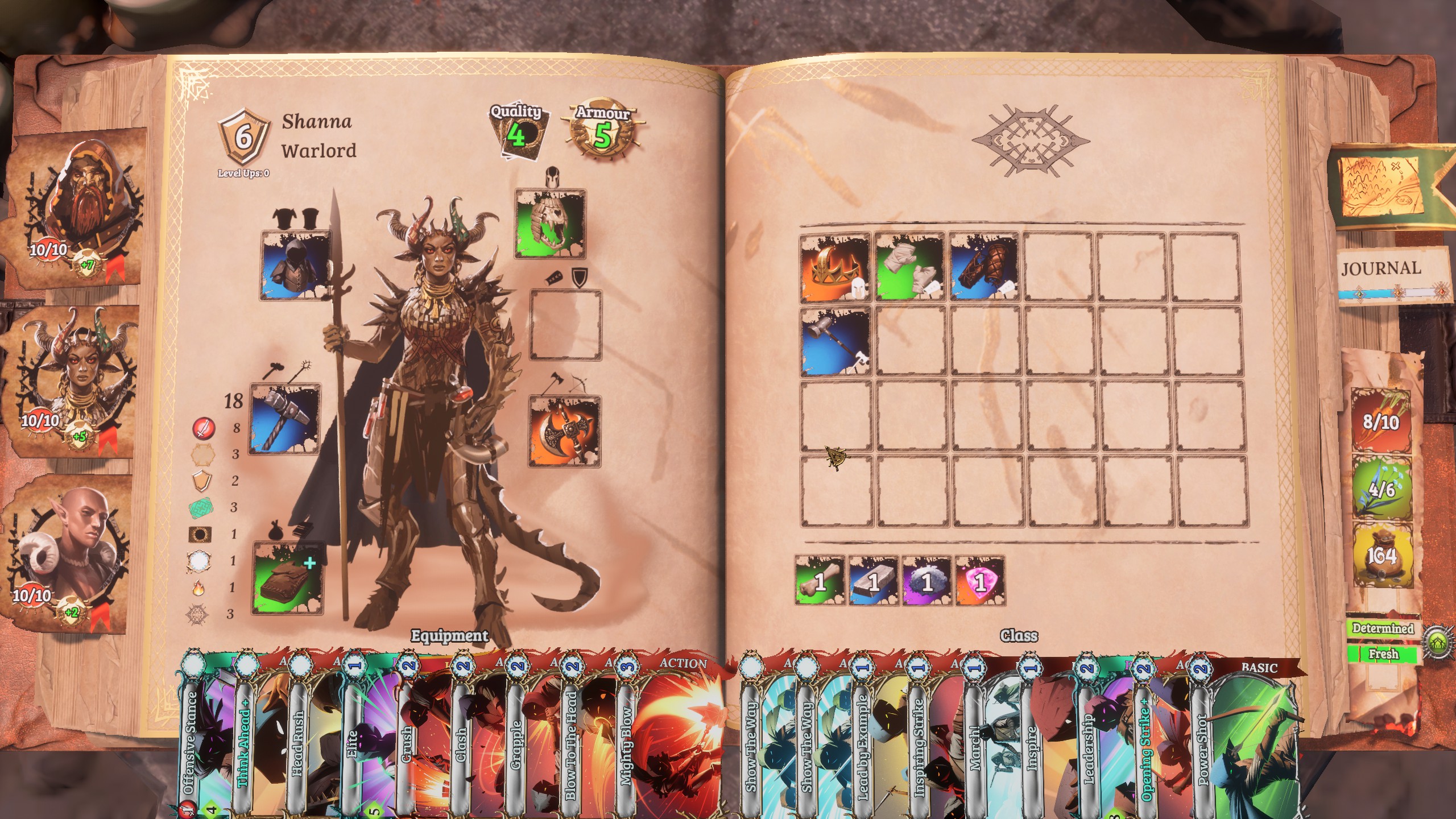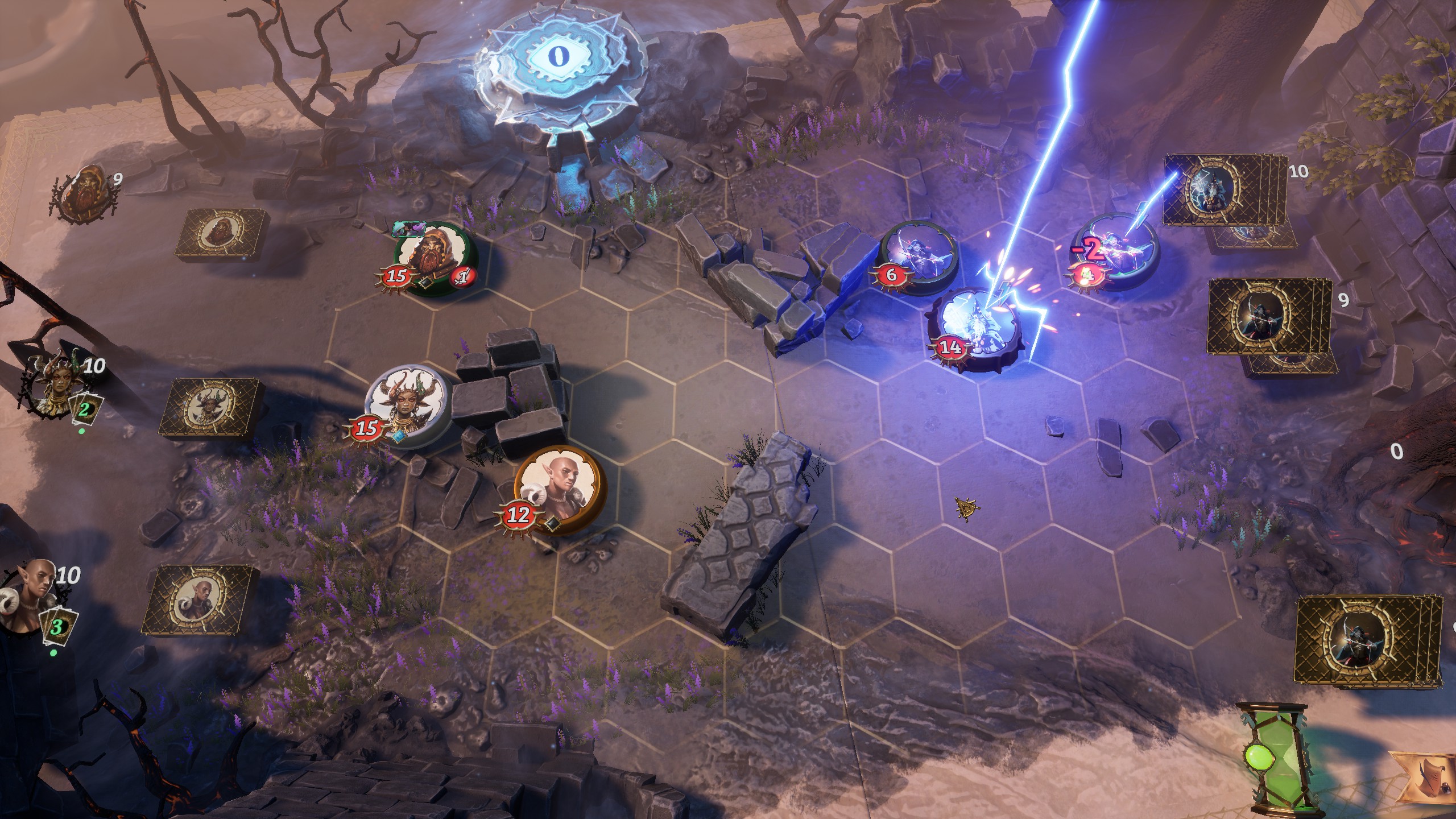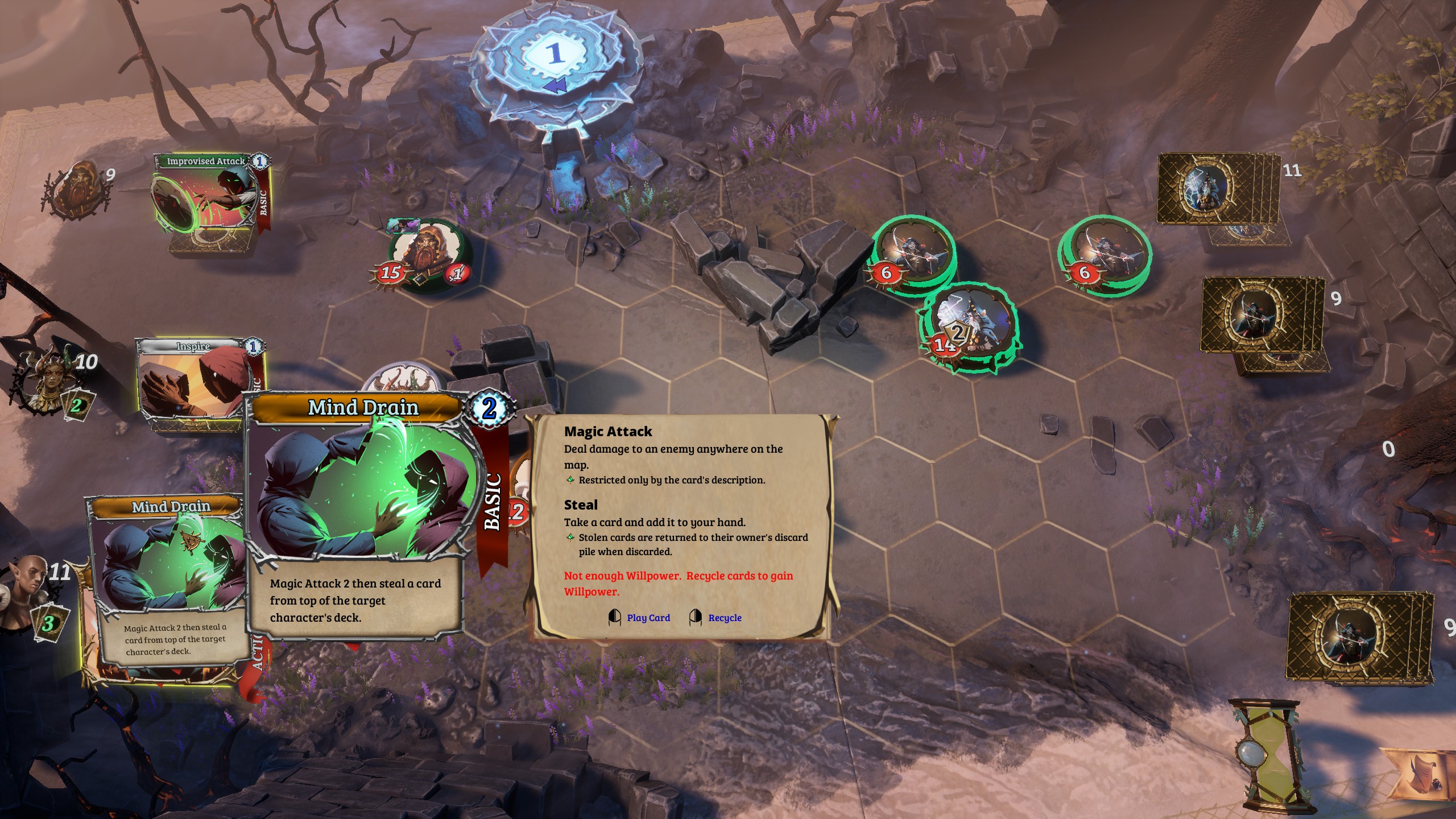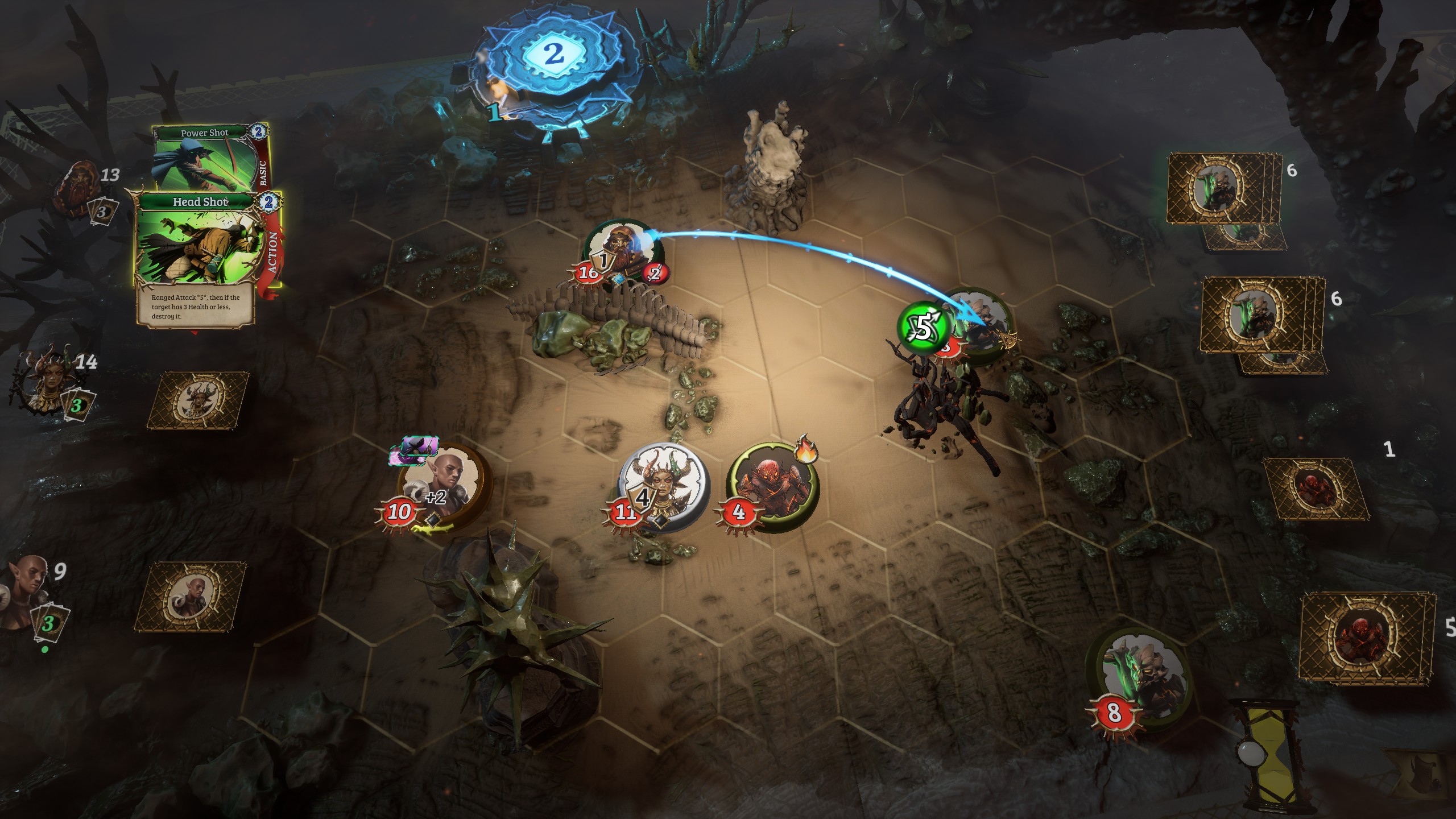Our Verdict
Trials of Fire's list of features may read like a videogame word salad, but the resulting combination makes for a fine RPG feast.
PC Gamer's got your back
What is it? Procedural fantasy roguelike with turned-based, CCG combat.
Expect to pay £15/$20
Release April 9, 2021 (for version 1.0)
Developer Whatboy Games
Publisher Whatboy Games
Reviewed on AMD Ryzen 5 3600, Nvidia GeForce 2080 Super, 32 GB RAM
Multiplayer No
Link Official site
On paper, Trials of Fire is everything I despise. I don't like turn-based roguelikes. I don't like card battlers, and I really don't like anything involving hexagons—the Poochie of the shape world. Trials of Fire features all of these, which in any sensible reality makes me the last person who should be reviewing it. But if you've looked out the window lately, through the haze of coronavirus toward the icecap-melting sun, you'll have noticed reality died on the way back to its home planet some time ago. As such, I'm unsurprised to discover that Trials of Fire is flipping excellent.
Set in a blighted fantasy land where wild Conans would happily graze, Trials of Fire sees you pick a trio of adventurers from an eventual pool of nine, before embarking upon a series of set quests across procedurally generated maps. Trials of Fire is presented in literal storybook fashion, with the game map sketched across the pages of a hefty sword and sorcery tome, while your characters are depicted as pop-up paper figures who scroll across the cracked roads and dusty plains of Ashe.
Between you and your key objectives are regular points of interest, ranging from small settlements to ancient ruins, cursed temples, prowling monsters and spooky forests. Encounters are initially presented in journal format, with the game describing the situation before offering a range of choices. Sometimes these choices require a skill check that results in a reward if successful, or damages your characters if you fail. Other times, your decisions will trigger a fight, in which case the world map disappears, and a top-down, 3D combat map rises from the book's pages.

Combat is a blend of turn-based strategy and fierce card duelling. The map is hex-based, with both your party and your opponents represented as beefy, colourful counters that slide toward one another, occasionally taking shelter behind the sprinkling of cover across the map. On your turn, your characters draw three cards each from their respective deck, which vary widely depending on their class. The default characters are Rastin, a hunter who specialises in ranged combat, with a sideline in summoning, Jarrah, a damage-dealing melee fighter, and Malkin, an elemental mage.
What's immediately striking about Trials of Fire is how good the combat feels. When you drag out one of Rastin's ranged attacks to target an enemy, an arrow flies out from his counter and thuds into your opponent, causing it to skitter on its space like a spun coin. When a character is killed, their counter bursts like a grenade, scattering shrapnel across the board. Trials of Fire does a fantastic job of evoking the abilities on the cards, which goes a long way to selling the game to a CCG sceptic like me.
Yet while this makes Trials of Fire more immediately engaging, it isn't what makes it special. That would be how cards simultaneously act as abilities and a resource. By default, playing a card requires you to spend a resource known as willpower. There are a handful of cards that generate willpower such as Advance, which also enables you to move forward. But the primary way of acquiring willpower is to sacrifice cards in your hand. This pool can be drawn from by all three party members unless you're using willpower for movement, in which case the sacrificed card must come directly from that character's deck.

Hence, of the nine cards in your hand, only around half of them are likely to be played in a standard round. You must figure out which cards to play and when. Jarrah might be your main damage dealer, for example, but it often takes her a turn or two to get into close range. So do you focus your efforts on pushing her forward, or spend your willpower on Rastin's and Malkin's ranged abilities?
What's immediately striking about Trials of Fire is how good the combat feels
The tactical scenarios that result from this are gripping, with each new hand bringing new challenges. The card battling is further bolstered by how the RPG systems tie into it. Winning battles and completing quests levels up your characters, letting you either upgrade cards in your current deck, or replace them with new, more powerful abilities. Similarly, new weapons and equipment will also expand your deck. A breastplate might provide defensive cards like Bulwark, which adds +7 to your defence when played, while a new bow might give Rastin the Headshot ability, which will instantly kill an enemy if the attack drops them to 3 HP or less. The real treasures, though, are the cards that provide free actions, extra movement, and particularly those that let your play more cards. My favourite card is probably Teamwork, which, when used on an ally, draws an extra card into the player's hand for every card your ally plays.
Yet the RPG elements can also work against you. Travelling across the world map tires your party out, and the more tired your party is, the more your deck will fill with cards like Fatigued and Exhausted, which serve no purpose other than clogging up your hand. Similarly, too much time spent exploring will diminish party morale, meaning you can't scour the land for every scrap of loot.

Balancing survival with progress is one of the game's main challenges, especially since reaching a quest objective usually triggers a tough boss fight that will test your affinity with your deck. If your party gets wiped out, the quest is over. This can be a little galling, especially if you're near the end. But both the main Trials of Fire quest and the subsidiary Lore quests are designed to be completed in two-to-four hours. Meanwhile, failure still grants experience, unlocking new cards for your existing party, and new characters like the Witch, who specialises in stealing enemy cards and using them against your foes.
For a game that borrows so many different ideas and mechanics, Trials of Fire is impressively seamless. The only area where it could be more consistent is the art. For me, the depiction of Ashe as this scoured and blasted land doesn't entirely gel with the bold, boardgame-like colours of your counters and cards. I particularly dislike the ludicrously chunky buttons on the game menus, which look like a soft toy will pop out the screen and sing a nursery rhyme if you push them.
More broadly, the storytelling suffers as a consequence of the game structure. While not startlingly original, Trials of Fire's wild and desolate fantasy world is convincing, while the encounters are written in pacey and engaging prose. Yet the quests themselves are straightforward MacGuffin hunts, while your party characters have little personality outside of battle. Admittedly, this is in keeping with classic sword and sorcery fiction, which tends to prioritise eventful action over character development. Nonetheless, once you've completed the main Trials of Fire quest, you've more or less seen what the game has to offer narratively, and while there are other quests available, it'll be the new cards and new characters that keep you playing.
Overall though, these are minor blemishes. Trials of Fire is a taut and muscular RPG roguelike that successfully distils the action and mystique of sword and sorcery into card battling form.
Trials of Fire's list of features may read like a videogame word salad, but the resulting combination makes for a fine RPG feast.
Rick has been fascinated by PC gaming since he was seven years old, when he used to sneak into his dad's home office for covert sessions of Doom. He grew up on a diet of similarly unsuitable games, with favourites including Quake, Thief, Half-Life and Deus Ex. Between 2013 and 2022, Rick was games editor of Custom PC magazine and associated website bit-tech.net. But he's always kept one foot in freelance games journalism, writing for publications like Edge, Eurogamer, the Guardian and, naturally, PC Gamer. While he'll play anything that can be controlled with a keyboard and mouse, he has a particular passion for first-person shooters and immersive sims.


